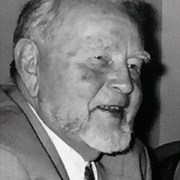In Memoriam Professor Wolfgang M. Pfeiffer (1919-2011)
On October 27, 2011, shortly before his 92nd birthday, Professor Wolfgang Pfeiffer ended his long productive life. Not ended, however, has the enriching heritage he left to all in the field of (trans)cultural psychiatry. Wolfgang Pfeiffer was born in 1919 into a family of Bavarian artists but decided to study medicine. His interest for other cultures led him already during his early student years to become active in an association for foreign students. His medical studies were interrupted through World War II; he completed these 1947 at the University of Munich and then became specialist in psychiatry and neurology, working at a hospital for patients with brain lesions in Tubingen. The decisive turn in his career came in 1956 when he applied for and received the medical director position of a psychiatric hospital in rural Java, Indonesia. Several years he lived with his young family in a mountainous region of Java in close contact with Indonesian colleagues and friends, accumulating clinical and research data and socio-cultural information which he analyzed and published after his return to Europe. He went back to Indonesia in 1971 for further comparative cultural research in the island of Nias and in remote areas of Java. Wolfgang Pfeiffer was the first medical doctor in a German-language country who started his academic teaching career in 1969 by submitting his Habilitations-Schrift (professoral dissertation) on findings and problems of transcultural psychiatry.
Professor Eric D. Wittkower wrote in a letter to me, dated October 28th, 1970: “Pfeiffer and Boroffka are the only representatives of German field research in cultural psychiatry”; and in his Foreword to the first edition of Pfeiffer’s “Transkulturelle Psychiatrie” (1971) - the first handbook of transcultural psychiatry - Wittkower called Pfeiffer a pioneer and his book a milestone in the history of cultural psychiatry. Already then, Pfeiffer’s comparative and ethno-psychiatric research in Indonesia and his comprehensive presentation of transcultural psychiatric knowledge of the day, had well earned him such praise from the original organizer of our discipline. In 1980 Pfeiffer, together with the psychologist W. Schoene, edited “Psychopathologie im Kulturvergleich”, a transcultural comparison of psychopathology with contributions by, among others, Wittkower, Prince, Murphy, Kiev, Bourguignon, Giel, Leighton, Jilek, Jilek-Aall. In the same year I first met Wolfgang Pfeiffer personally in a conference on ethnomedicine-ethnopsychiatry at the University of Hamburg, together with Ekkehard Schröder, founding editor of Curare, journal of ethnomedicine and transcultural psychiatry. After the meetings, Pfeiffer took us - Louise Jilek-Aall and myself and our little daughter Martica - to the University of Muenster in Westphalia where he held the chair of medical psychology from 1974 until his return to Bavaria in 1984. He introduced us to his graduate students in Muenster and “loaned” one of them, Dr Bernward Hochkirchen, to join us in Canada. and take part in our cultural-psychiatric investigations among the indigenous people of the Northwest. Wolfgang Pfeiffer and his wife Traudl became our personal friends. Pfeiffer’s recommendation opened us the doors of psychiatric institutions and traditional healing shrines in Indonesia where we traced his past research journeys. With his introduction we were able to interview colleagues, patients, and traditional healers, and to observe and film healing ceremonies. The Pfeiffers visited with us in British Columbia. and we toured the Pacific coast together. We then were guests in their home in northern Bavaria where he guided us through the historical cities of Nuremberg and Bamberg, and invited me to present a paper at the University of Erlangen. At that time Wolfgang Pfeiffer confided that he was looking forward to what in Bavaria is called “privatisieren’, i.e., to enjoy a leisurely retirement. However, instead of leisure he started a new phase of activity with courses and publications on inter-cultural psychotherapy with emphasis on the psychological and socio-cultural situation of the migrants that came into Germany. especially from Turkey. In a letter to us in 1987 he had written that this migration presented the most important transcultural problem in Germany. At a post-retirement age Pfeiffer studied Turkish language and culture. In the 1990s he was the co-organizer and president of German-Turkish Psychiatry Congresses and the co-founder of the German-Turkish Society for Psychiatry, Psychotherapy and Psychosocial Health.
Already in the 1980s, Wolfgang Pfeiffer worked on a new edition of his handbook on transcultural psychiatry. The re-edition of “Transkulturelle Psychiatry - Ergebnisse und Probleme” [Transcultural Psychiatry - Findings and Problems] was published in 1994. Enlarged with new data it opened further areas of psychology, psychiatry, psychosomatic medicine, and traditional healing to comparative cultural analysis. As comprehensive opus on cultural psychiatry the new edition of his “Transkulturelle Psychiatrie” set a standard which at that time no other work of our discipline had reached. I was honoured by his invitation to write the preface to this work and then to compose a detailed book review, published in the McGill Transcultural Psychiatric Research Review; vol. 32, 1995, pp. 59-64.
Cultural psychiatry and psychology owe much to Wolfgang Pfeiffer, the humanistic German scholar, who devoted his life to study the mind of peoples of different cultures, to find culture-congenial ways of psychotherapeutic assistance, and who published already in 1971 the first text encompassing the entire field of our discipline.
Selected publications by Wolfgang M. Pfeiffer
- “Geistige Störungen bei den Sundanesen” [Mental disorders among the Sundanese]. Psychiatrica et Neurologica (Basel) 143: 315-333, 1962.
- “Vergleichende psychiatrische Untersuchungen bei verschiedenen Bevölkerungsgruppen in West-Java”. [Comparative psychiatric investigations among various populations in West-Java]. Archiv Psychiatrie Nervenheilkunde 204:404-414, 1963.
- “Versenkungs- und Trancezustände bei indonesischen Volksstämmen” [Altered states of consciousness and trance states among Indonesian population groups]. Nervenarzt 37: 7-18, 1966.
- “Psychiatrische Besonderheiten in Indonesien” [Psychiatric peculiarities in Indonesia]. In: Petrilowitsch, N. (ed.) Contributions to Comparative Psychiatry, vol.1. Basel: Karger 1967, pp.102ff.
- “Transkulturelle Aspekte der Depression” [Transcultural aspects of depression]. In: Schulte, W. & Mende, W. (eds.) Melancholie. Stuttgart: Thieme, 1969, pp.97ff.
- “Transkulturelle Aspekte der Schizophrenie” [Transcultural aspects of schizophrenia]. In: Kranz, H. & Heinrich, K. (eds.) Schizophrenie und Umwelt Stuttgart: Thieme, 1971, pp.79ff.
- “Transkulturelle Psychiatrie” [Transcultural psychiatry] Foreword by E. D. Wittkower. Stuttgart: Thieme, 1971.
- “Psychische Störungen in einer traditionsbestimmten Kultur, Nias/Indonesien” [Psychic disorders in a tradition-directed culture, Nias/Indonesia]. Confinia psychiatrica 17: 15-41, 1974.
- “Psychotherapeutic aspects of folk-medicine in Indonesia”. South Asian Digest of Regional Writing, 8: 46-61, 1979.
- “Psychopathologie im Kulturvergleich”[Psychopathology in cultural comparison] edited with W. Schoene. Stuttgart: Enke, 1980.
- “Transkulturelle Aspekte zur Theorie von Missbrauch und Abhängigkeit” [Transcultural aspects of the theory of drug abuse and dependence]. In: Feuerlein, W. (ed.) Theorie der Sucht. Berlin: Springer, 1986, pp.71ff.
- “Transkulturelle Psychiatrie - Ergebnisse und Probleme” [Transcultural psychiatry - findings and problems] 2nd revised enlarged edition; Preface by W.G.Jilek. Stuttgart, New York: Thieme 1994; xii, 252pp.ill.

